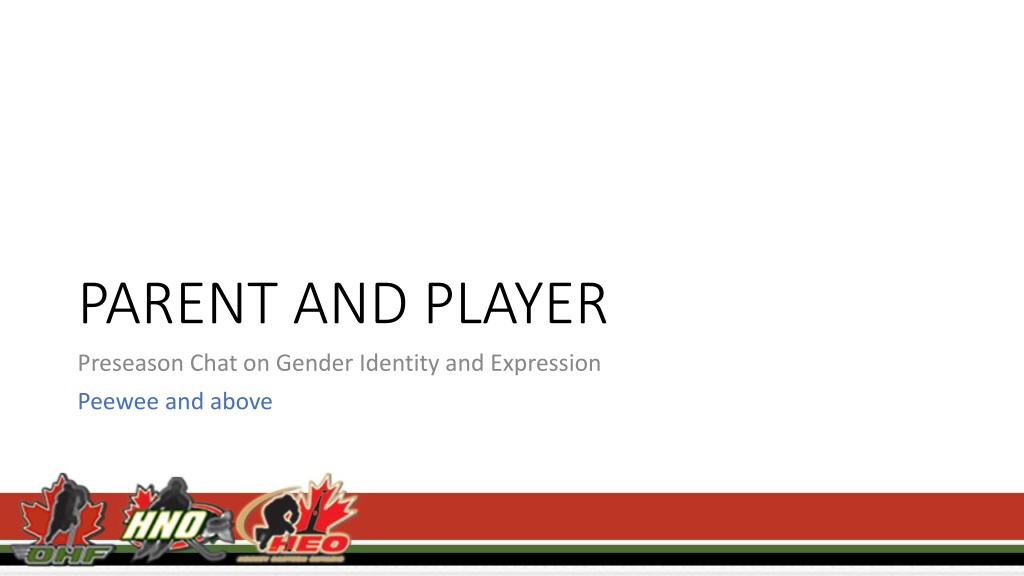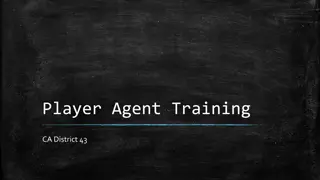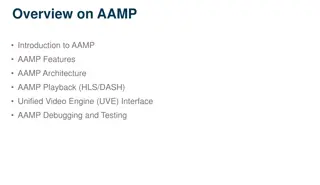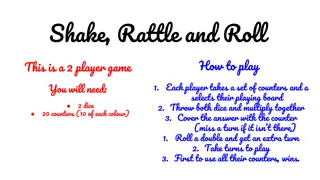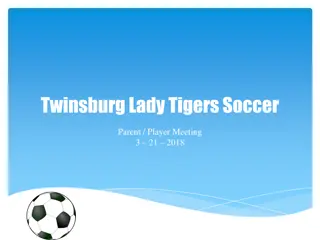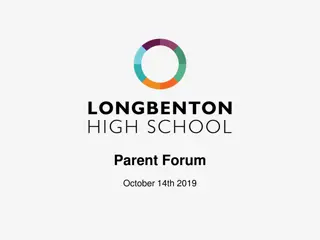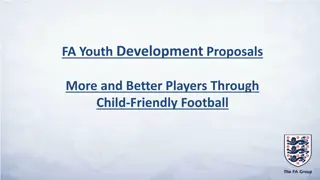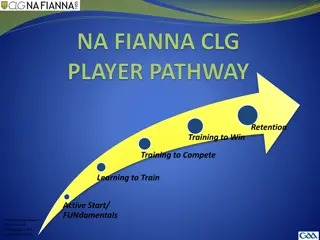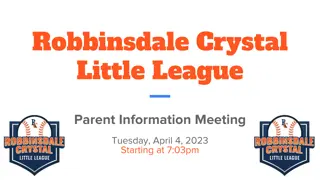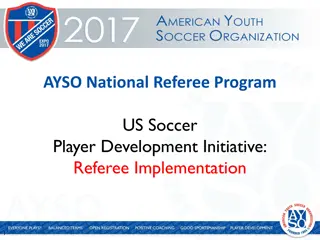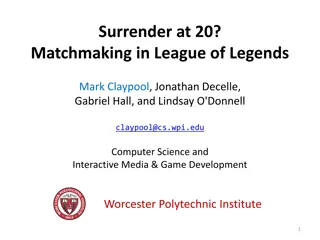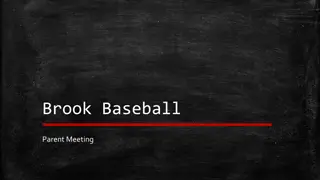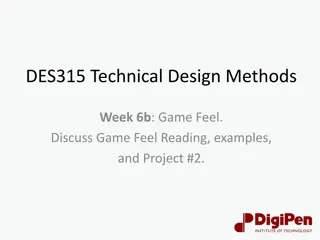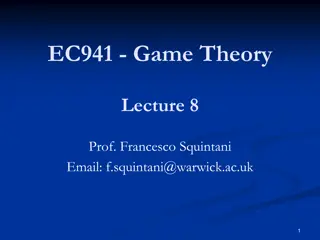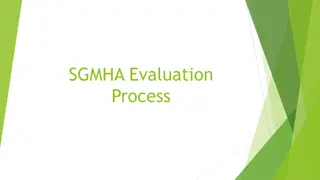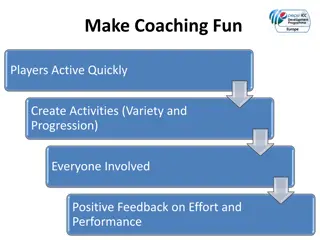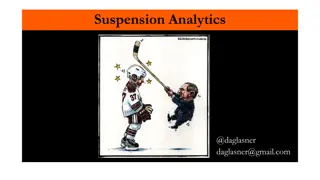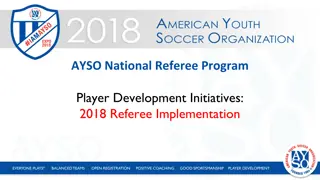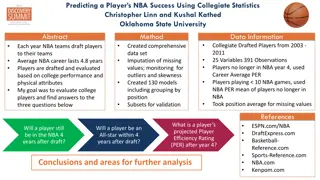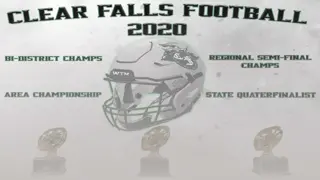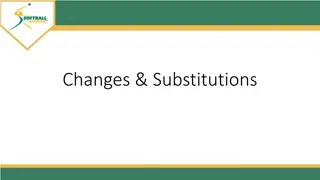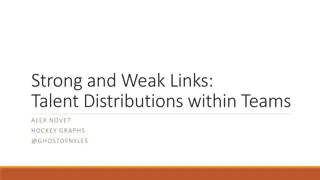PARENT AND PLAYER
Encouraging inclusiveness, respect, and proper language in sports settings to create a safe and welcoming environment for all participants. Learn about gender identity, rights, responsibilities, and accommodations. Activities promote understanding and highlight the importance of supporting individual identities.
Download Presentation

Please find below an Image/Link to download the presentation.
The content on the website is provided AS IS for your information and personal use only. It may not be sold, licensed, or shared on other websites without obtaining consent from the author.If you encounter any issues during the download, it is possible that the publisher has removed the file from their server.
You are allowed to download the files provided on this website for personal or commercial use, subject to the condition that they are used lawfully. All files are the property of their respective owners.
The content on the website is provided AS IS for your information and personal use only. It may not be sold, licensed, or shared on other websites without obtaining consent from the author.
E N D
Presentation Transcript
PARENT AND PLAYER Preseason Chat on Gender Identity and Expression Peewee and above
AGENDA 1. What is Gender Identity and Expression 2. Inclusiveness and Respect 3. Proper Language 4. Rights and Responsibilities 5. Accommodations 6. Confidentiality
INCLUSIVENESS & RESPECT The OHF, (ALLIANCE Hockey) and (INSERT Association) are fully committed to inclusive programming for all participants. We are fully committed to ensuring all of our participants respect the rights of each individual, and it is our responsibility as organizations to ensure a safe and fun environment for all participants. We fully support and respect the human rights code and law of Ontario and Canada.
PROPER LANGUAGE Using the correct pronouns at someone s request is a way of validating that we all have the right to live our truth, to share our truth, and to be granted safety, respect and dignity in doing so. Referring to someone by the pronouns they ve requested is a way to show someone respect for who they are. Here is some examples of Non-binary ( gender neutral) pronouns that may be preferred: They Them Theirs
ACTIVITY TO COMPLETE WITH TEAM You may want to think about how you would answer the following questions My gender identity is: __________ I use the word(s): ______________ to describe my experience of attraction. I express my gender in a: ______________way. My assigned sex is: _______________.
RIGHTS & RESPONSIBILITIES Discrimination: Is when a person experiences negative treatment or impact because of an actual or perceived connection to one of the 17 grounds that are protected under the Ontario Human Rights code. first-hand or by association failing to accommodate needs on basis of protected grounds allowing discrimination to continue when those in positions of authority know or should know it exists even if no one objects to the behavior or circumstance direct and obvious or indirect and subtle isolated events or entrenched in an organization s culture & policies even if participation in the behaviour is widespread
RIGHTS & RESPONSIBILITIES The Dressing Room Policy states that players, parents/guardians and staff/volunteers have the right to . 1. Respect & equal treatment 2. Protection from discrimination/harassment 3. Define & express gender identity without fear 4. Be referred to by self-identified name/pronoun 5. Safely & equitably access gender-segregated spaces 6. Be accommodated for code-related needs 7. Privacy and confidentiality
RIGHTS & RESPONSIBILITIES All staff/volunteers of the MHA have the responsibility to: 1. Treat all individuals respectfully and equitably 2. Ensure safe, equitable and inclusive environments and procedures 3. Protect the rights of individuals to define & express their gender identity without fear 4. Refer to others by their self-identified name/pronoun 5. Ensure individuals are able to safely and equitably access gender- segregated spaces 6. Work together with players to accommodate code-related needs 7. Ensure players private information is kept confidential
RIGHTS & RESPONSIBILITIES Players have the responsibility to: 1. Treat all others including other players, parents/guardians and staff and volunteers of the MHA with respect 2. Ask for assistance and support to the best of their ability from the MHA when experiencing discrimination or when requiring a related accommodation. 3. Work together with the MHA to find appropriate accommodations to meet code-related needs.
ACCOMMODATIONS Special arrangements are called accommodations .Accommodations create opportunities for people to do their job, participate in an activity or access a service they would not have been able to otherwise. A person who is deaf, for example, may require a sign language interpreter as an accommodation to help them do part of their job.In hockey, a person may have a need for extra privacy when changing before and after playing.This need may be related to gender identity, gender expression or to other areas considered under the Human Rights code such as disability or religion.
ACCOMMODATIONS Players make a request to the Minor Hockey Association that they would like an accommodation within the Dressing Room Policy. Minor Hockey Association considers the request in confidence with the individual seeking the accommodation. There is a difference between a right and an accommodation. A right is something provided in law and an accommodation is something that can be requested by a Player that is experiencing a barrier to participation.
CONFIDENTIALITY Once the MHA receives a written request for a code-related accommodation, it is important to make the individual feel safe and comfortable. A Player making a request are entitled to a confidential time and space to discuss possible solutions, andthat they may bring a friend or relative with them for support if they wish. Confidentiality means that sharing of information is done by the Player in all circumstances. It is not your information to share even to the Player s parents.
